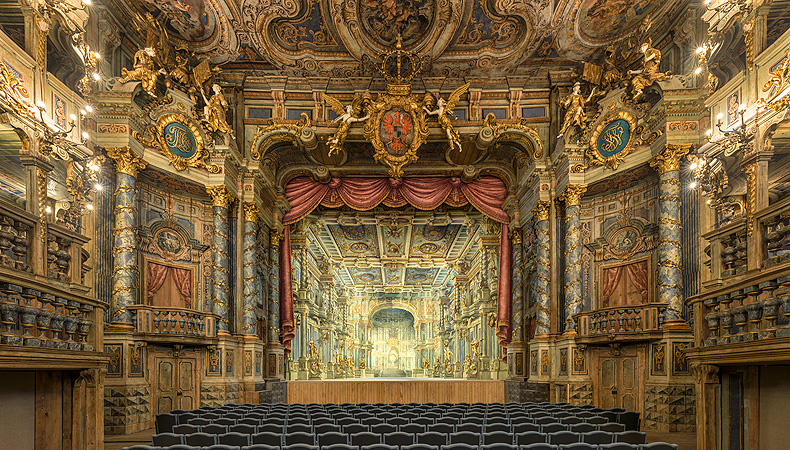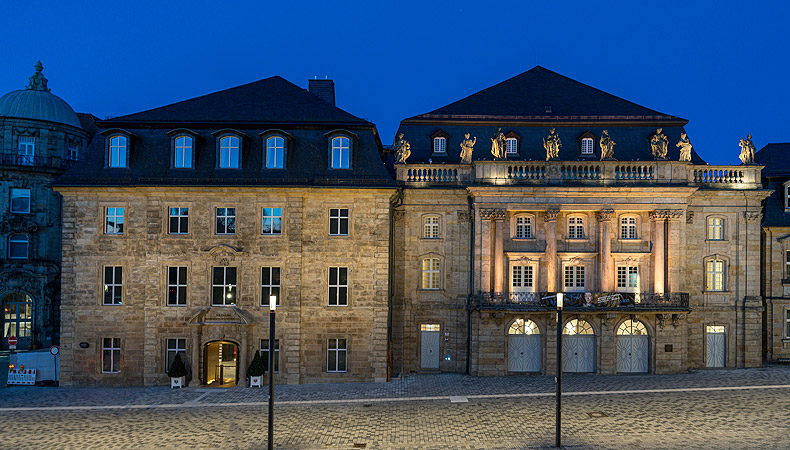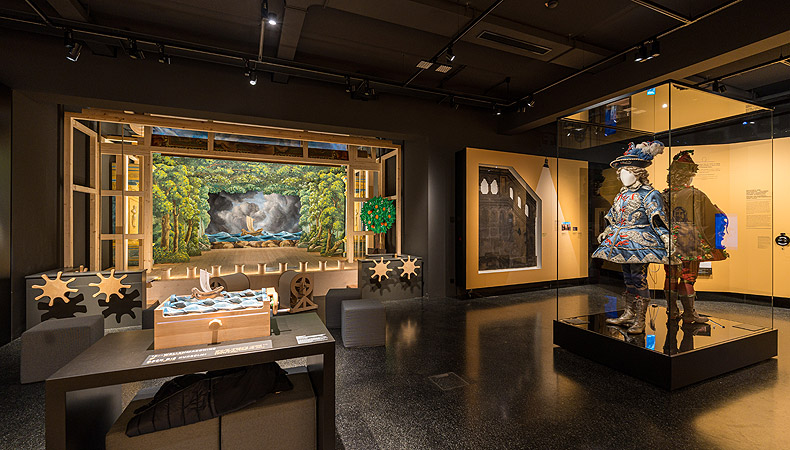Object description:
Margravial Opera House: World Heritage & Museum – Bayreuth
The Margravial Opera House is the best preserved example of a free-standing Baroque court theatre. It was modelled on the greatest opera houses of the time in Vienna and Dresden. As a unique monument of 18th-century festival and music culture it was inscribed by UNESCO in the list of World Cultural Heritage of Humanity in 2012.
The driving force behind this exceptional project was Margravine Wilhelmine of Brandenburg-Bayreuth (1709-1758), who was herself an avid music and theatre lover. The theatre was built for the lavish festivities surrounding the wedding of the Bayreuth princess Elisabeth Friederike Sophie and Duke Carl Eugen of Württemberg in September 1748.
The architect appointed to design the new opera house was the leading theatre architect of the day, the Italian Giuseppe Galli Bibiena who had been working for the Viennese imperial court. His son Carlo Galli Bibiena was responsible for the project in Bayreuth and stayed on at the court until the death of the Margravine, creating numerous stage set designs and festival decorations for the Margravial Opera House.
The Margravial Opera House is modelled on Italian loge theatres of the period. The fully preserved tiers of loges made primarily of wood and canvas are installed as a free-standing construction within the stone exterior. The interior of the theatre was constructed in record time with some of the wooden architectural elements and sculptures prefabricated and painted elsewhere. Thus a masterpiece of ephemeral festival architecture was completed from 1744 until 1748 in under four years.
The restoration that took place from 2013 to 2018 re-established the original light and airy atmosphere of the illusionist painting in the auditorium with its overwhelming three-dimensional effect.
The auditorium and stage form a single unit. The large stage portal framed by columns at the rear of the auditorium faces the court loge. The sculptures decorating the loge, like those above the stage, glorify the Hohenzollern dynasty and the founders of the theatre, Margrave Friedrich and Margravine Wilhelmine of Brandenburg-Bayreuth.
The complementing exhibition about the Margravial Opera House and Baroque festival and theatre culture invites visitors of all ages to participate actively: A fun experience for everyone of an inquiring mind!
Address
Opernstraße 16
95444 Bayreuth
0921 75969-22
www.bayreuth-wilhelmine.de
Opening hours
April-September: 9 am-6 pm
October-December: 10 am-5 pm
January-March: 10 am-4 pm
open daily
Please note that the opera house may be closed temporarily due to event rehearsals.
Current closing times
Closed on: January 1, Shrove Tuesday, December 24/25/31
Guided tours
Guided tours take place regularly and can be booked for individual guests and groups.
Admission fees 2026
10 euros regular
9 euros reduced
Tickets for the Margravial Opera House: World Heritage & Museum are also available online in our ticket shop.
Combination ticket
(New Palace + Margravial Opera House)
15 euros regular
13 euros reduced
Combination ticket
"The world of Wilhelmine"
(all Bayreuth objects)
21 euros regular
19 euros reduced
Children under 18 are admitted free of charge.
Accessibility
Getting here / parking
Bayreuth
www.bahn.com
Bus to "Luitpoldplatz"
Parking facilities in the centre of Bayreuth can be found at www.bayreuth.de.
Further information
Administrative office
Schloss- und Gartenverwaltung
Bayreuth-Eremitage
Ludwigstraße 21
95444 Bayreuth
0921 75969-0
Fax 0921 75969-15
sgvbayreuth@ bsv.bayern.de
www.bayreuth-wilhelmine.de




Facebook Instagram YouTube